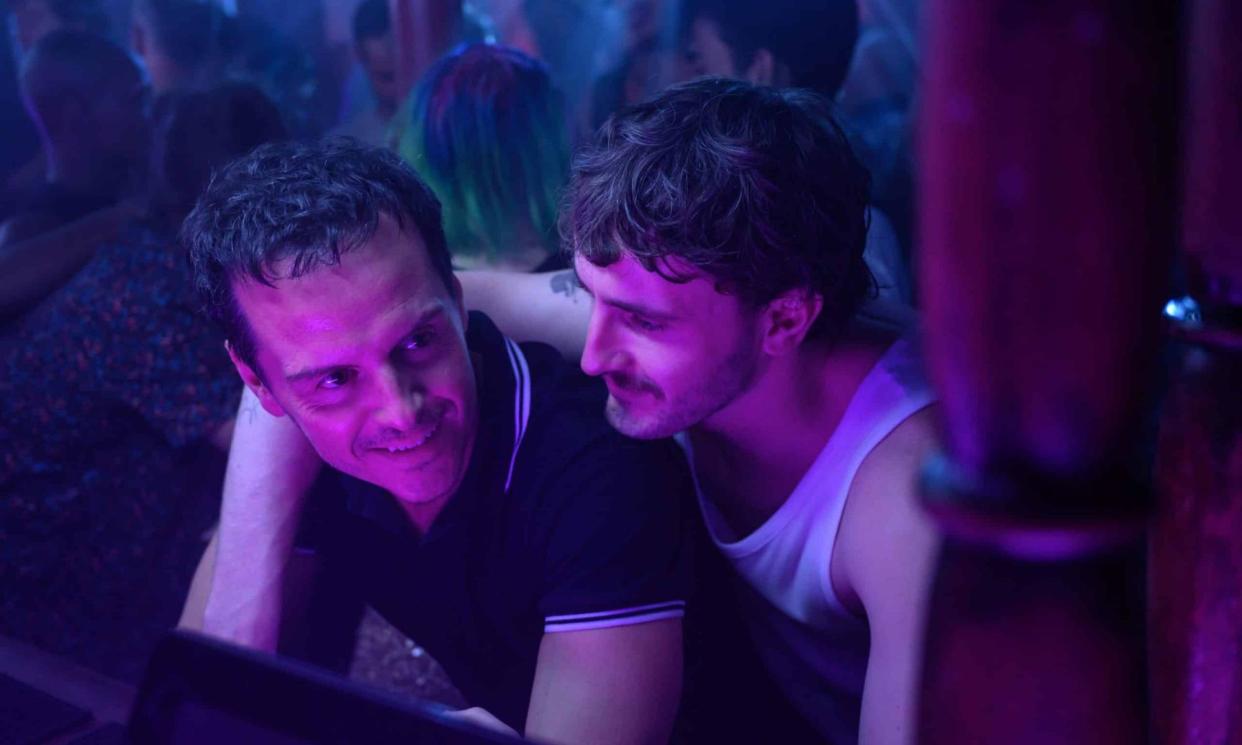All of Us Strangers review – Paul Mescal and Andrew Scott tremendous in a beautiful fantasy-romance

Andrew Haigh’s mysterious, beautiful and sentimental film is a fantasy-supernatural romance about loneliness and love. It concerns the climacteric of middle age when you realise you are probably nearer to death than birth, there is no guarantee that you will live your life inside a relationship and your parents were ordinary, vulnerable people – just like you.
All of Us Strangers is adapted by Haigh from the Japanese novel Strangers by Taichi Yamada, translated into English by Wayne Lammers (already filmed in Japanese), possibly tilting away from the the original’s tone of disturbing possibilities towards a melancholy sweetness, and very much keeping its feel for the eerie and the uncanny but finding something gently revelatory in these things.
Andrew Scott is Adam, a screenwriter in the first phases of depression, listlessly working on a script inspired by his relationship with his late parents, who were killed in a car crash when he was 12. In semi-silent montages, Haigh shows us Adam neglecting his work, watching daytime TV, eating biscuits, broodingly going through old photos of his childhood and putting the music of that era on the turntable, namely Frankie Goes to Hollywood’s The Power of Love. He lives on his own in an apartment in a modern block in London, a weirdly Ballardian-looking high rise in which he fancies himself to be the only occupant – or almost. Adam notices another man who keeps roguishly catching his eye: Harry, played by Paul Mescal. Like Adam, he is lonely; unlike Adam, he is a bit of a drinker. The booze emboldens Harry to approach Adam.
Just as this tricky relationship is beginning to take off, Adam goes on a whim to see the old suburban neighbourhood near Croydon where he grew up. Here, he makes a sensational discovery: mum (Claire Foy) and dad (Jamie Bell) are somehow still alive and living in his old house, which is decorated and furnished just as it was in the mid-80s. They have not aged and greet him with a mild, wry bemusement and easygoing welcome, as if Adam was home early from a term at uni and wanted his laundry doing. This is not a writerly reverie that Adam is having; he is by now about the age his parents were when they died and the universe has given him this secret miracle, to speak with his parents as an adult about his life, being gay and being on the verge of a relationship.
In its Englishness and politeness, All of Us Strangers reminded me a little of Ian McEwan’s The Child in Time and also Will Self’s The North London Book of the Dead, whose hero discovers that, after dying, his late mother has gone to live in a flat in north London’s Crouch End. (In Self’s novel How the Dead Live, we find that dead people go to live in bland suburbs.) When Adam first has a solo chat with his cerise-tracksuit-clad mother in the kitchen – she has briskly told him to take off his wet things after he’d been caught in the rain on his way over – I found myself thinking of Marty McFly’s Freudian encounter with his mother in Back to the Future. Yet the implications are not comic in the same way. His mum looks at Adam and realises that he looks exactly like her dad, the kind of epiphany that indicates that this quasi-ghost-mum is not simply a figment of his imagination.
His mum and dad aren’t angry about his gayness, nor do they make any show of being unimpressed, surprised or matter-of-fact about it – they don’t do the traditional twinkly-eyed we-knew-when-you-were-eight-years-old bit parents sometimes have to do in art, as in life, with varying degrees of sincerity. His dad does wryly say he could never catch a ball. His mum is frowningly concerned about the “lonely” or “childless” way of life he has chosen, evidently unaware of legal and cultural changes that have happened since she died. There are further fantasy scenes in which Haigh indulges in a note of comedy and even whimsy: Adam climbs into bed with his parents, wearing an enlarged version of his childhood PJs, and it’s a measure of the absolute seriousness with which Bell, Foy and Scott play the scene that it doesn’t just come across as silly.
As for Adam and Harry’s relationship, it continues to hold out the promise of happiness, with interesting dialogue scenes: they discuss the way the word “gay” has been replaced by “queer”. Harry’s theory is that “gay” was discredited by being used as a term of abuse in school: a “gay bike”, “gay haircut”, etc. Opinions may be divided over the film’s final scene, whether it takes this drama too far into another (familiar) genre and whether the scenes in which we’ve made such a tearful emotional investment have merely been misdirection. But what tremendous performances from all four; what style Haigh brings to this movie, fusing the themes of romantic relationships and intergenerational relationships of his previous movies Weekend and 45 Years.
It’s a heartstopping moment when Adam walks broodingly through a park and sees, in the distance, another man who briefly gestures with his head towards a thicket of trees; Adam follows, but the scene isn’t what we think. The film is an enormously satisfying and affecting experience.
• All of Us Strangers screened at the Telluride film festival, and is released on 26 January in UK and Irish cinemas.

 Yahoo Movies
Yahoo Movies 
